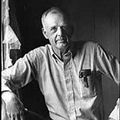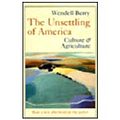| 2004年8月5日是溫德爾•貝瑞的70大壽,在他的一生中,貝瑞扮演過許多角色:他是長年倡導永續農耕的智者、是道德與傳統的擁護者、是拒絕使用拖拉機的著名農人、亦是反對電腦的傑出作家。

溫德爾•貝瑞居家照
要真正的欣賞貝瑞這一個人,必須先理解,他將生命建立在一個信念上,這信念即是他所謂:「倘若你立下一個承諾,並誓死力行,便會有所回報。」而重要的是,他給自己一個承諾:他要找個住處並能就此安居下來。
因為安定,貝瑞時常針貶時事的政治哲學,縱使是長達45年文學生涯中也鮮有改變。1970年代,他將新穎的環保觀念結合傳統土地情感,讓環保理念看起來更成熟。隨後,他點出未受限制的市場成長以及科技擴張,對社會價值和生態環境的衝擊,讓「保守派」看起來有如莽撞的未來主義者。在一個政治觀明顯兩極化的國家中,他代表的是一個拒絕被輕易貼上價值標籤的美國之聲。
1960年代早期,溫德爾•貝瑞正步上文學生涯的康莊大道。他的小說和詩集,使他成為其他年輕、世界主義作家所羨幕的對象。他獲得加州史丹佛大學的研究生獎學金,順利完成學業。隨後,他取得夢寐以求的紐約大學教職。
然而,在1964年,貝瑞毅然拋棄都市生活,反歸樸實的鄉間。年長的同事試圖勸告他說,「年輕人,你不能再回家去了。」但是,貝瑞仍是回家了。他搬到肯塔基州的亨利郡-那裡是他祖先150年來所耕耘的土地-他在此照顧家庭農場,並且以教書為業。返鄉後,他未再離開,並寫了40餘本詩集、小說、以及散文集。 |
Wendell Berry, 70 years old today, has established himself as
many things in his lifetime: a veteran sage of sustainable agriculture;
a progressive defender of virtue and tradition; one of our most famous
farmers to renounce the tractor; and one of our most acclaimed authors
to shun the computer.

Wendell Berry, right at home
To appreciate Berry, you must first understand that he has
staked his life on a gamble of faith -- "the faith being," he says,
"that if you make a commitment, and hang on until death, there are
rewards." His own commitment, most of all, is to place: to finding a
home and staying there.
While keeping himself put, Berry has constructed a politics
that has changed little over his 45-year literary career, yet remains
iconoclastic. In the 1970s, he made new-guard environmentalism look aged
by marrying it with traditional agrarian sentiment. Then he made
"conservatives" look like reckless futurists by pointing to the threat
that unchecked market growth and technological expansion pose to both
community values and ecological well-being. In a nation ostensibly
locked into a well-defined political divide, he represents an American
voice that avoids easy classification.
In the early 1960s, Wendell Berry was on his way to a bright
career in the literary world. The envy of many other young, cosmopolitan
authors, he had published a book of poems and a novel. He finished a
fellowship at Stanford and accepted a coveted teaching position at New
York University.
Then, in 1964, Berry decided to abandon the city and return to
his rural roots. Attempting to dissuade him, elder faculty members
warned, "Young man, you can't go home again." Yet Berry did just that.
He moved to Henry County, Kentucky -- where his forebears had worked the
land for more than 150 years -- to tend his family farm and to teach.
There he has remained, producing more than 40 books of poetry, fiction,
and essays. |
|
1934年8月5日,即溫德爾出生之時,全美共有大約680萬個家庭農場,而到了1975年,數字已減少了60%,僅剩250萬,商業農場的面積卻與日劇增。在2次世界大戰前仍相當罕見的石化產物,使用率也有相當驚人的成長。這些變化,與其歸咎於科技大勢所趨,還不如說是刻意的計劃。透過相繼的政府政策,美國農業部傳達給農民的訊息即是:「擴大或改行。」尼克森政府的農業部部長藹爾•埠茲宣稱農業「現在已是大事業」,而家庭農場「就如現代的企業經營一樣…必須適應,否則就是出局。」
到了1970年代,農業產業化的影響,使得農人普遍的感到不滿:包括單一作物耕作、殺蟲劑的使用、農業面積擴大、以及隨之的負債累累。溫德爾•貝瑞將小農民初期的絕望,具體而尖銳的表現出來。在他1977年的著作「美國的不安(註)The
Unsettling of America」中,從萌芽中的永續農耕運動出發,對農業產業化做最具毀滅性的批評。

《美國的不安》(The Unsettling of America)
貝瑞寫著:「由於越來越不知節儉、惜福…...,現在的農業侵蝕著表土、水資源、石化燃料、以及人力資源……等,且無悔意。我們不假思索的吃著,沒有任何一個社會曾如此過。」
城市居民沒有資格忽視這些現象,他說:「不論日常生活有多麼都市化,我們的軀體仍必須仰賴農業維生;我們來自大地,最終也將回歸大地,因此,我們的存在,是基於農業之中,無異於我們存於自己的血肉。」書裡他下了結論:「以生命的資源頭為生存的代價,明顯的是自我毀滅。」
距離他寫下這些字的時間已有25年了,然而,貝瑞仍是不斷的提出這些疑慮。就如他在1999年所說的:「我們的農業政策,如同我們的能源政策,就是能用多少就用多少。」為了反駁這種價值觀,他透過文章和著作,成為田地均分的主要提倡者,即一種倡導小農經濟下農人細心經營土地的耕作模式。如同過去其他的倡導者,貝瑞訴諸於傑佛遜式的理想。這位開國元老是這麼寫的:「農夫是最有價值的公民,他們最具生命力,最具獨立自由的精神,最善良;他們與國家攸戚相關,與國家的自由和利益永遠相結合。」
正如某位總統所說,田地均分的想法已存在相當長的時間了,它一向是一種平民主義的想法,但鮮少包含環保意圖。學者金柏利•史密斯這麼寫著:「若貝瑞的生態小農經濟理論並不特別起眼,那是因為他使得田地均分的觀念與環保的結合,看起來是如此的自然,我們便認定小農經濟一直都包含著環保觀念-要不然就是環保觀念意指的是對家庭農業的支持。」事實上,在貝瑞以前,農人與環保人士間的鴻溝,有如伐樹者及保樹者間的對立。

家庭農場 - 環保在這裡再次成為固有的思想
|
When Wendell Berry was born on Aug. 5, 1934, there were some 6.8
million family farms in the U.S. By 1975, the number had fallen by more
than 60 percent, to 2.5 million. The size of individual farms had
skyrocketed. And the use of petrochemical inputs, rarities before World
War II, had soared. These changes were less the product of technological
inevitability than of design. Through subsequent administrations, the
Department of Agriculture told farmers to "get big or get out." Earl Butz, secretary of agriculture under Richard Nixon, proclaimed that
farming "is now a big business" and that the family farm "just like the
modern business enterprise ... must adapt or die."
By the 1970s, there was widespread discontent among farmers
about the impact of agribusiness methods: the monocultures and
pesticides, the expansion and debt. Wendell Berry crystallized and
sharpened small farmers' inchoate despair. In his 1977 The Unsettling of
America, he produced the most withering critique of industrial
agriculture to spring from a nascent movement for sustainable farming.

The Unsettling of America
"Without regret," Berry wrote, "with less and less interest in
the disciplines of thrift and conservation ... our present agriculture
wastes topsoil, water, fossil fuel, and human energy. ... We are eating
thoughtlessly, as no other entire society ever has been able to do."
City dwellers could ill-afford to ignore these trends, he
argued. "[N]o matter how urban our life, our bodies live by farming; we
come from the Earth and return to it, and so we live in agriculture as
we live in flesh." Elsewhere in the book he concluded, "To live at the
expense of the source of life is obviously suicidal."
In the two and a half decades since he wrote those words,
Berry has continued to voice the same concern. As he put it in 1999,
"Our farm policy, like our energy policy, is simply to use up all we
can." Opposing this mindset, he has emerged, through his essays and
literary works, as a key spokesperson for agrarianism, a philosophy that
celebrates the small farmer's careful stewardship of the land. Like
agrarians before him, Berry invokes Jeffersonian ideals: "Cultivators of
the Earth are the most valuable citizens," the founding father wrote.
"They are the most vigorous, the most independent, the most virtuous,
and they are tied to their country and wedded to its liberty and
interests by the most lasting bands."
As the mention of a powdered-wigged president suggests,
agrarianism has been around for a long time. It has often been populist,
but rarely ecologically minded. Scholar Kimberly Smith writes, "If
Berry's ecological agrarianism doesn't look particularly innovative to
us, it is because he makes the marriage of agrarian and environmental
thought seem so natural that we assume agrarianism always implied
ecological sensitivity -- or that ecological sensitivity always implied
support for family farming." In fact, before Berry, the gulf between
farmers and environmentalists was nearly as deep as that between loggers
and tree-sitters.

The family farm -- where
environmentalism becomes old again. |
